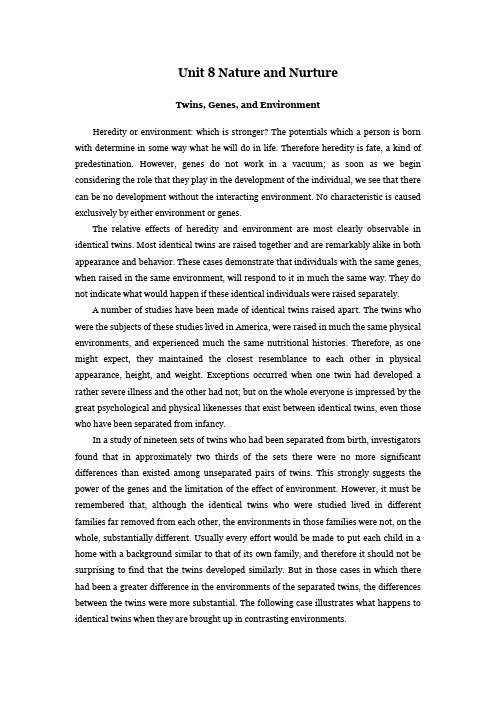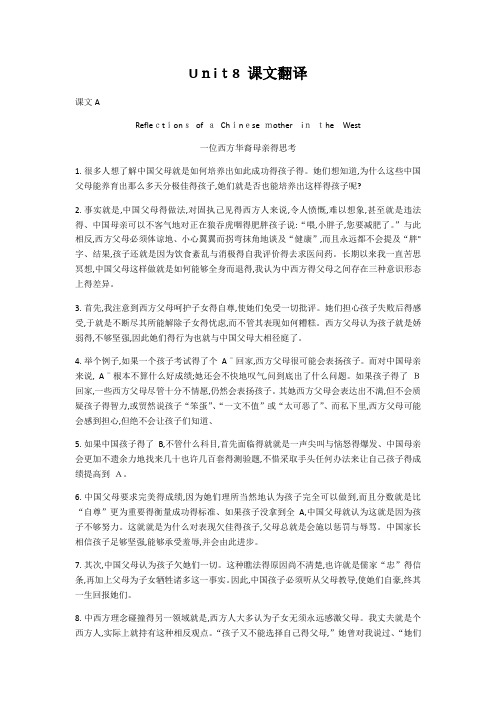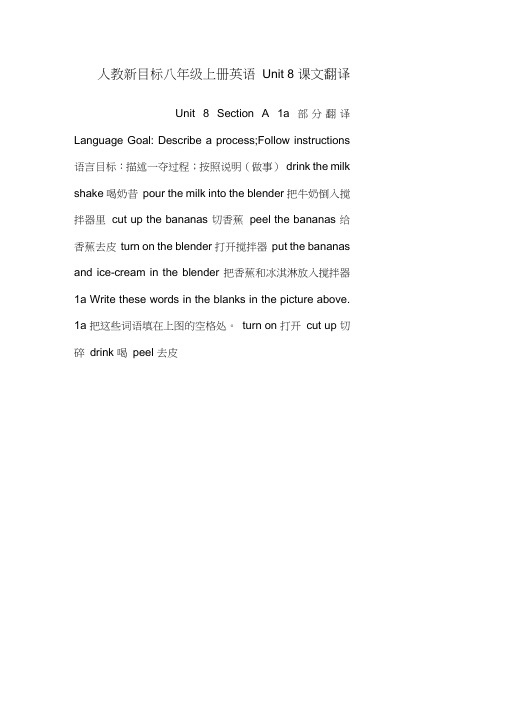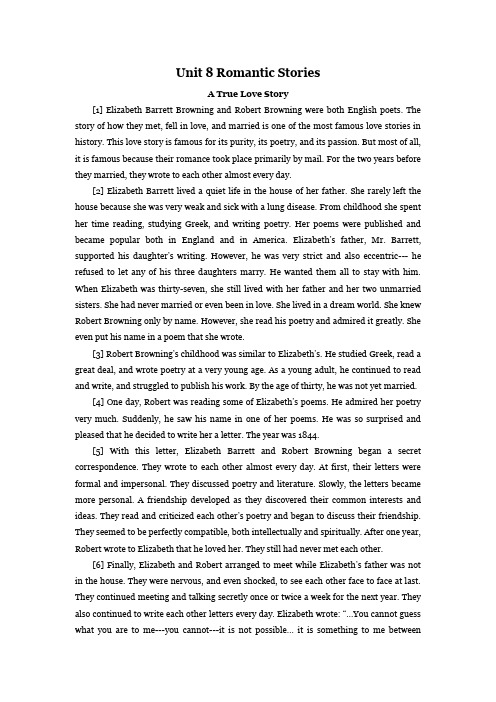Unit 8 课文翻译
Unit-8-Nature-and-Nurture新编大学英语第二版第三册课文翻译

Unit 8 Nature and NurtureTwins, Genes, and EnvironmentHeredity or environment: which is stronger? The potentials which a person is born with determine in some way what he will do in life. Therefore heredity is fate, a kind of predestination. However, genes do not work in a vacuum; as soon as we begin considering the role that they play in the development of the individual, we see that there can be no development without the interacting environment. No characteristic is caused exclusively by either environment or genes.The relative effects of heredity and environment are most clearly observable in identical twins. Most identical twins are raised together and are remarkably alike in both appearance and behavior. These cases demonstrate that individuals with the same genes, when raised in the same environment, will respond to it in much the same way. They do not indicate what would happen if these identical individuals were raised separately.A number of studies have been made of identical twins raised apart. The twins who were the subjects of these studies lived in America, were raised in much the same physical environments, and experienced much the same nutritional histories. Therefore, as one might expect, they maintained the closest resemblance to each other in physical appearance, height, and weight. Exceptions occurred when one twin had developed a rather severe illness and the other had not; but on the whole everyone is impressed by the great psychological and physical likenesses that exist between identical twins, even those who have been separated from infancy.In a study of nineteen sets of twins who had been separated from birth, investigators found that in approximately two thirds of the sets there were no more significant differences than existed among unseparated pairs of twins. This strongly suggests the power of the genes and the limitation of the effect of environment. However, it must be remembered that, although the identical twins who were studied lived in different families far removed from each other, the environments in those families were not, on the whole, substantially different. Usually every effort would be made to put each child in a home with a background similar to that of its own family, and therefore it should not be surprising to find that the twins developed similarly. But in those cases in which there had been a greater difference in the environments of the separated twins, the differences between the twins were more substantial. The following case illustrates what happens to identical twins when they are brought up in contrasting environments.Gladys and Helen were born in a small Ohio town and were separated at about eighteen months of age. They did not meet again until they were twenty-eight years old. Helen had been adopted twice. Her first foster parents had proved to be unstable, and Helen had been returned to the orphanage after a couple of years; after several months she was again adopted, by a farmer and his wife who lived in southeastern Michigan. This was her home for the next twenty-five years. Her second foster-mother, though she had had few educational advantages herself, was determined that Helen should receive a good education; Helen eventually graduated from college, taught school for twelve years, married at twenty-six, and had a daughter.Gladys was adopted by a Canadian railroad conductor and his wife. When she was in the third grade, the family moved to a rather isolated part of the Canadian Rockies, where there were no schools, and Gladys' formal education came to an end, and was not resumed until the family moved to Ontario. She stayed at home and did housework until she was seventeen, and then went to work in a knitting mill. She went to Detroit at nineteen, got a job, and married when she was twenty-one.Helen had been healthier than Gladys, in childhood and adulthood, but other than that, their environments had been very similar except for their educations. Their weight, height, hair color, and teeth were very similar. The differences that distinguished them were obviously associated with the different social lives they had led.Helen was confident, graceful, made the most of her personal appearance, and showed considerable polish and ease in social relationships. Gladys was shy, self-conscious, quiet and without charming or graceful manners. A scientist who studied them remarked, "As an advertisement for a college education the contrast between these two twins should be quite effective."Considering the nature of their environmental experiences, the differences in Helen and Gladys are not surprising. Since psychological traits depend so much upon experience, it is to be expected that they will reflect it. On the other hand, traits that are not liable to be influenced by the environment are more likely to exhibit a high degree of similarity in identical twins. Important as they are, genes alone are never absolutely responsible for any trait. What we can do is set by the genes, but what we actually do is largely determined by the environment.基因、环境与双胞胎遗传与环境究竟哪一个影响更大呢?从某种程度上讲,一个人生来具有的潜力将决定他一生的作为。
Unit8 课文翻译

Unit8 课文翻译课文AReflectionsof aChinese mother inthe West一位西方华裔母亲得思考1.很多人想了解中国父母就是如何培养出如此成功得孩子得。
她们想知道,为什么这些中国父母能养育出那么多天分极佳得孩子,她们就是否也能培养出这样得孩子呢?2.事实就是,中国父母得做法,对固执己见得西方人来说,令人愤慨,难以想象,甚至就是违法得、中国母亲可以不客气地对正在狼吞虎咽得肥胖孩子说:“喂,小胖子,您要减肥了。
”与此相反,西方父母必须体谅地、小心翼翼而拐弯抹角地谈及“健康”,而且永远都不会提及“胖"字、结果,孩子还就是因为饮食紊乱与消极得自我评价得去求医问药。
长期以来我一直苦思冥想,中国父母这样做就是如何能够全身而退得,我认为中西方得父母之间存在三种意识形态上得差异。
3.首先,我注意到西方父母呵护子女得自尊,使她们免受一切批评。
她们担心孩子失败后得感受,于就是不断尽其所能解除子女得忧虑,而不管其表现如何糟糕。
西方父母认为孩子就是娇弱得,不够坚强,因此她们得行为也就与中国父母大相径庭了。
4.举个例子,如果一个孩子考试得了个Aˉ回家,西方父母很可能会表扬孩子。
而对中国母亲来说, Aˉ根本不算什么好成绩;她还会不快地叹气,问到底出了什么问题。
如果孩子得了B回家,一些西方父母尽管十分不情愿,仍然会表扬孩子。
其她西方父母会表达出不满,但不会质疑孩子得智力,或贸然说孩子“笨蛋”、“一文不值”或“太可恶了”、而私下里,西方父母可能会感到担心,但绝不会让孩子们知道、5.如果中国孩子得了B,不管什么科目,首先面临得就就是一声尖叫与恼怒得爆发、中国母亲会更加不遗余力地找来几十也许几百套得测验题,不惜采取手头任何办法来让自己孩子得成绩提高到A。
6.中国父母要求完美得成绩,因为她们理所当然地认为孩子完全可以做到,而且分数就是比“自尊”更为重要得衡量成功得标准、如果孩子没拿到全A,中国父母就认为这就是因为孩子不够努力。
人教新目标八年级上册英语Unit8课文翻译

人教新目标八年级上册英语Unit 8 课文翻译Unit 8 Section A 1a 部分翻译Language Goal: Describe a process;Follow instructions 语言目标:描述一夺过程;按照说明(做事)drink the milk shake 喝奶昔pour the milk into the blender 把牛奶倒入搅拌器里cut up the bananas 切香蕉peel the bananas 给香蕉去皮turn on the blender 打开搅拌器put the bananas and ice-cream in the blender 把香蕉和冰淇淋放入搅拌器1a Write these words in the blanks in the picture above. 1a 把这些词语填在上图的空格处。
turn on 打开cut up 切碎drink 喝peel 去皮pour倒put 放Unit 8 Section A 1b 部分翻译Listen and put the instructions in order. 听录音,把操作说明排序。
Turn on the blender. 打开搅拌器。
Cut up the bananas. 切香蕉。
Drink the milk shake.喝奶昔。
Pour the milk into the blender. 把牛奶倒入搅拌器。
Put the bananas and ice-cream in the blender. 把香蕉和冰洪淋放入搅拌器。
Peel three bananas. 剥三根香蕉。
Unit 8 Section A 2c 部分课文翻译Ask and answer questions about how to make fruit salad. 关于怎样制作水果沙拉提问并回答。
A:Let's make fruit salad.A:让我们制作水果沙拉吧。
Unit 8 Romantic Stories新编大学英语第二版第一册课文翻译

Unit 8 Romantic StoriesA True Love Story[1] Elizabeth Barrett Browning and Robert Browning were both English poets. The story of how they met, fell in love, and married is one of the most famous love stories in history. This love story is famous for its purity, its poetry, and its passion. But most of all, it is famous because their romance took place primarily by mail. For the two years before they married, they wrote to each other almost every day.[2] Elizabeth Barrett lived a quiet life in the house of her father. She rarely left the house because she was very weak and sick with a lung disease. From childhood she spent her time reading, studying Greek, and writing poetry. Her poems were published and became popular both in England and in America. Eli zabeth’s father, Mr. Barrett, supported his daughter’s writing. However, he was very strict and also eccentric--- he refused to let any of his three daughters marry. He wanted them all to stay with him. When Elizabeth was thirty-seven, she still lived with her father and her two unmarried sisters. She had never married or even been in love. She lived in a dream world. She knew Robert Browning only by name. However, she read his poetry and admired it greatly. She even put his name in a poem that she wrote.[3] Robert Browning’s childhood was similar to Elizabeth’s. He studied Greek, read a great deal, and wrote poetry at a very young age. As a young adult, he continued to read and write, and struggled to publish his work. By the age of thirty, he was not yet married.[4] One day, Robert was reading some of Elizabeth’s poems. He admired her poetry very much. Suddenly, he saw his name in one of her poems. He was so surprised and pleased that he decided to write her a letter. The year was 1844.[5] With this letter, Elizabeth Barrett and Robert Browning began a secret correspondence. They wrote to each other almost every day. At first, their letters were formal and impersonal. They discussed poetry and literature. Slowly, the letters became more personal. A friendship developed as they discovered their common interests and ideas. They read and criticized each other’s poetry and began to discuss their friendship. They seemed to be perfectly compatible, both intellectually and spiritually. After one year, Robert wrote to Elizabeth that he loved her. They still had never met each other.[6] Finally, Elizabeth and Robert arranged to meet while Elizabeth’s father was not in the house. They were nervous, and even shocked, to see each other face to face at last. They continued meeting and talking secretly once or twice a week for the next year. They also continued to write each other letters every day. Elizabeth wrote: “…You cannot guess what you are to me---you cannot---it is not possible… it is something to me betweendream and miracle.” Robert answered that he had never kept a journal before, but he had started one now. In it he wrote the date of every visit with her and how long it lasted. He even wrote the number of minutes they had been together and said that they added up to two full days in length.[7] Then, in September, 1846, in a secret marriage ceremony, Elizabeth Barrett became Elizabeth Barrett Browning. A week later, without telling Elizabeth’s father, the happy couple eloped to Italy. The shock was terrible for Mr. Barrett, but his anger could not diminish their happiness. In 1849, they succeeded in having a son. They lived in Italy, extremely happy, for fifteen years, until Elizabeth’s death in 1861.一个真实的爱情故事1 伊丽莎白·巴雷特·勃郎宁和罗伯特·勃郎宁都是英国诗人。
Unit 8 Two Truths to Live By课文翻译

1. 生活的艺术就是要懂得何时紧抓、何时放手,因为人生就是个矛盾:在令我们依恋于它所赋予的种种恩赐的同时,它也注定我们最终得放弃这些恩赐。
正如古代的犹太学者们所言:“人降世时拳头紧握,但离世时还得松手。
”2. 我们当然要紧抓生命,不仅因为它奇妙无比,而且因为它所蕴含的美已散布到了地球的每个角落。
其实,我们都懂得这个道理,然而我们往往只有在回首过去时才会明白这一点,只是在记起它往昔的美丽时,我们却突然发现已时过境迁了。
3. 我们铭记褪色的美、消逝的爱。
但是这种记忆却饱含着苦涩,我们痛惜没有在美丽绽放的时候注意它,没有在爱情到来的时候回应它。
4. 最近的一次经历再次使我明白了这个道理。
一次严重的心脏病发作之后,我在重症监护病房住了几天。
那不是个令人愉快的地方。
5. 一天上午,我得接受几项额外的检查。
由于所需的检查器械在医院另一头的一幢建筑里,所以我得躺在轮床上被推着穿过院落。
6. 在我们从病房出来的瞬间,阳光洒在我的身上,我所感觉到的就只有这阳光。
它是多么美丽,多么温暖,多么闪耀,多么辉煌啊!7. 我环视四周,看看是否还有其他人也在享受这金色的阳光,然而所有的人都是来去匆匆,且大多数人眼睛只顾盯着地面。
继而我便想到,我也常常陷于琐事,有时甚至陷入俗物之中,对身边每天的美景也是视而不见。
8. 我从这次经历所洞悉的灼见,其实与这次经历本身一样平淡无奇:生命的恩赐是珍贵的—只是我们对此从未留心罢了。
9. 因此,对我们有着自相矛盾的要求的人生一方面要求我们:不要过于忙碌而错失生活中的美好和庄严; 虔诚地迎接每个黎明的到来;拥抱每一个时辰,抓住珍贵的每一分钟。
10. 紧紧把握人生……但又不能抓得过死,松不开手。
这是人生这枚硬币的另一面,也正是其矛盾的另一面:我们必须接受失去的现实,学会如何放手。
11. 要学会这点并非易事。
尤其当我们年轻时,以为世界在我们的掌控之中,但凡激情满怀的我们一心想得到的东西,都将属于我们。
大学英语综合教程2unit8课文翻译

A Fable For TomorrowThere was once a town In the heart of America where all life seemed to live in harmony with its surroundings. The town lay in the midst of a checkerboard of prosperous farms, with fields of grain and hillsides of orchards where, in spring, white clouds of bloom drifted above the green fields. In autumn, oak and maple and birch set up a blaze of colour that flamed and flickered across a backdrop of pines. Then foxes barked in the hills and deer silently crossed the field, half hidden in the mists of the autumn mornings.明天的寓言从前在美国中心有一个小镇,那里的万物看上去都与其四周的环境融洽相处。
小镇的四周是像棋盘交错的兴旺的农庄,还有一块块的田地和一座座遍布山坡的果园。
春天来了,白色的鲜花云彩般地漂浮在绿色的田野上;秋天到了,橡树、枫树和桦树色彩斑斓,在一片松树林间火焰般地燃烧与跳跃。
小山上狐狸吠叫,田野间小鹿静静地跃过,所有的一切都在秋天清晨的薄雾中半隐半现。
Along the roads, laurel, viburnum and alder, great ferns and wild flowers, delighted the traveler’s eye through much of the year. Even in winter the roadsides were places of beauty, where countless birds came to feed on the berries and on the seed heads of the dried weeds rising above the snow. The countryside was, in fact, famous for the abundance and variety of its bird life, and when the flood of migrants was pouring through in spring and autumn people travelled from great distances to observe them. Others came to fish the streams, which flowed clear and cold out of the hills and contained shady pools where trout lay. So it had been from the days many years ago when the first settlers raised their houses, sank their wells and built their barns.在路的两旁,一年中许多时候,月桂树、荚莲、桤木、蕨类植物和各样的野花都能让过往的行人赏心悦目。
资料《Unit8课文原文与翻译(素材)译林版八年级英语下册》
译林版八年级下册英语课文及翻译UNIT 8英中对照版Comic strip– What are you going to do, Hobo?霍波,你要去做什么?– Plant trees.种树。
– Will more trees be planted this year?今年要种更多的树吗?– Yes. Trees are good for us.是的。
树对我们很有益。
–OK. I’ll go with you, I like digging in the garden.好的。
我跟你一起去。
我喜欢在花园里挖洞。
– Are you serious?你是认真的吗?–Sure, I’ll plant breadfruit trees. Breadfruit … Yummy!当然。
我要种面包果树。
面包果……好吃!Welcome to the unit– What should we do to live a green life, class?同学们,对绿色生活我们应该做些什么呢?– My dad used to drive me to school, but now we take the underground.More and more families own cars and this causes serious air pollution.我的爸爸以前常常开车送我去上学,但是现在我们坐地铁了。
越来越多的家庭拥有汽车,导致严重的空气污染。
–I agree. It’s wise for people to choose public transport or ride bicycles.我同意。
人们选择公共交通或骑自行车是很明智的。
– I think we can take shorter showers to save water.我认为我们应该缩短淋浴时间,以节约用水。
– Yes. And we should remember to turn off the lights when we leave a room.是的。
Unit 8 Money新编大学英语第二版第二册课文翻译
Unit 8 MoneyTime Spent Agonizing over Money[1] Within hours of a recent major stock market drop, I telephoned my Ford dealer and ordered the station wagon that I test-drove the day before. As my friends not so subtly pointed out, the Dow Jones Industrial Average didn't have much to do with my financial situation and shouldn't affect my purchase. Besides, my old car had caused me headaches for months.[2] Still, I spent the evening asking myself: Could I afford a new car? Should I be saving instead of spending? Would we need to cut back on vacations?[3] On the list of items people worry about, money is almost always at the top.[4] A study in the Wall Street Journal found that 70 percent of the public lives from paycheck to paycheck. Mortgage debt has increased 300 percent since 1975, and consumer bankruptcies are at an all-time high. Most marriages that fail list financial problems as a contributing factor.[5] When the Dow fell 554 points last October, millions of people lost billions of dollars, on paper anyway. There was expert anxiety on Wall Street and old-fashioned worry on Main Street. Our reaction confirmed what we already knew: We are a people consumed by financial stress.*A “Raw Material”[6] As the Bible tells us, worrying about money—or anything else for that matter—won't do us any good. “Who of you by worrying can add a single hour to his life?” Jesus asked. “And why do you worry about clothes? See how the lilies of the field grow? They do not labor or spin.”[7] In my heart, I aspire to be like those lilies. But in my head, I feel a need to hoard.[8] It is an unusual person who can live free from financial stress, or who can spend money on others as easily as he spends it on himself.[9] Thomas Edison was one of that rare breed. Had the great inventor stored his money, he would have died a wealthy man. His first successful invention netted him $40,000, a huge sum in 1869. During his lifetime, he patented 1,093 inventions, yet he departed the world penniless.[10] Years later, his son C harles recalled his father's approach to money: “He considered it a raw material, like metal, to be used rather than amassed, and so he kept plowing his funds back into new objects. Several times he was all but bankrupt. But he refused to let dollar signs govern his actions.”[11] John Wesley was the same. The founder of Methodism had the highest earnedincome in 18th century England, but he gave it all away. His philosophy about money was simple: “Earn all you can, save all you can, give all you can.”*Root of Evil?[12] Money may not be the root of all evil, but if it keeps us up at night, it has become way too important in our lives.[13] That was the lesson of Leo Tolstoy's tale “Elias”, which told of a rich farm couple who lost all their money and were forced to take jobs as servants.[14] A guest one day asked the wife if she was miserable being poor, especially in light of the great wealth she had once enjoyed. The woman's answer—that she was happier than ever before—surprised the visitor.[15] “W hen we were rich, my husband and I had so many cares that we had no time to talk to one another, or to think of our souls, or to pray to God,” the wife explained. “We lay awake at night worrying, lest the ewes should lie on their lambs, and we got up again and again to see that all was well... Now, when my husband and I wake in the morning, we always greet each other in love and harmony. We live peacefully, having nothing to worry about.”[16] For most of us, financial security is an elusive goal. No matter how much we have, it's not enough. Kahlil Gibran put it this way: “The fear of need, when the pantry is full, is the thirst that can not be satisfied.”[17] When the stock market falls, we can panic, hoard, and worry if we have enough. Or we can take a deep breath and remember: Money is merely a raw material to be plowed back into something else.把时间花在为钱苦恼上1 最近一次股市大跌后的几个小时内,我就打电话给我的福特汽车商,订购了我前一天试开过的旅行车。
冀教版八年级上册英语第八单元课文翻译
UNIT 8 Celebrating Me! Lesson 57:Help!][0:00.738]UNIT 8 第八单元[0:02.496]Celebrating Me! 赞美我![0:05.388]Lesson 57: 第57课:[0:07.202]Help! 求助![0:09.300]THINK ABOUT IT![0:10.888]What do you think of yourself?[0:13.723]How are you unique?[0:16.105]Are you proud of yourself?[0:18.487]Why or why not?[0:20.642]What makes Li Ming a good student?[0:24.498]From: 来自:[0:25.405]Li-Ming@[0:28.297]To: 到:[0:29.261]jenny@compmail.ca jenny@compmail. ca[0:31.473]Subject: 主题:[0:32.777]My report for school 为全校作报告[0:34.818]Date: 日期:[0:35.612]08/12 9:03 AM 12月8日上午9点03[0:39.071]Dear Jenny, 亲爱的珍妮:[0:40.489]I hope you can help me with my English project this week. 这周我希望你可以帮助我完成英语课的任务。
[0:44.061]We are describing ourselves in a report. 我们要在报告中描述自己。
[0:46.500]I don't know what to write about myself. 我不知道写我自己什么。
[0:49.392]We are writing about what makes us unique - our special talents, our personal strengths. 我们要写的是是什么使我们独一无二——我们特殊的才能,我们个人的长处。
(Unit8)九年级课文翻译及知识点梳理
Unit8你可以帮助清扫城市公园P62 3A《做一名志愿者真好!》七十七中学是三个非常特别的年轻人李慧平,林培,和朱明的家。
这三名学生自愿献出他们的时间来帮助其他人。
这项志愿者工作一个星期要花费他们每个人几个小时,所以这是一个很大的奉献(付出)。
李慧平喜爱阅读,她通过在当地小学的课后关爱(托管)中心工作将这份爱好充分利用起来。
在这儿她帮助孩子们读书。
林培喜爱动物,并计划通过努力学习在毕业后当一名兽医。
他每个星期六早晨都会去一家动物医院工作。
朱明想成为一个职业的歌手。
他要为那些在这个城市生病住院的人们唱歌,让他们开心起来。
“当志愿者真是太棒了!”李慧平说。
“帮助其他人不仅让我感到很快乐(倒装句),而且这也是把时间花在做我喜欢的事情上了。
”林培说他已经学习并掌握了很多动物方面的知识。
朱明说他在医院遇到了一些很令人佩服的人。
这三个学生计划在他们的学校创办一个“学生志愿者计划”。
“不要再犹豫了,”李慧平说。
“现在就来当一名志愿者吧!”本文章的知识点:not only......but (also)P64 3A上个星期,每个人都在想方设法让一个叫Jimmy的男孩开心起来,他是一个“自行车修理能手”。
而就在这个星期,Jimmy终于又开心起来了。
本星期一,他告诉电台记者为了买旧自行车,他已经把钱花光了。
他还张贴了一些告示收集旧自行车,并打电话把这个问题告诉他的朋友们。
他甚至在当地一家超市散发广告传单。
然后他又告诉了学校的老师们有关他的问题,于是他们为家长开设了一部热线。
他想到的这些办法效果非常好。
现在他已有十六辆自行车要修理了,然后把这些车送给没有自行车的孩子们。
P66 SECTION 2 WHILE YOU READ阅读策略:如果你在英语中遇到某些不理解的词或短语,例如,你可以试着问问自己它是什么词性,它可能是个名词,动词,或是一个介词,等等。
知道它是什么可以帮助更好地理解。
理解了它就可以让你在将来正确地使用新的英语单词或者短语。
- 1、下载文档前请自行甄别文档内容的完整性,平台不提供额外的编辑、内容补充、找答案等附加服务。
- 2、"仅部分预览"的文档,不可在线预览部分如存在完整性等问题,可反馈申请退款(可完整预览的文档不适用该条件!)。
- 3、如文档侵犯您的权益,请联系客服反馈,我们会尽快为您处理(人工客服工作时间:9:00-18:30)。
餐馆里几乎坐满了人。
屋里一片低沉的嗡嗡谈话声。
人们一边忙着用餐一边在相互交谈着。
突然,靠近餐馆中央的一张餐桌上传来了一声尖叫:“真该死,西尔维亚......”
那个男子人正在高声喊叫。
他脸涨得通红,朝着坐在他对面的妇女喊叫了大约十五秒钟。
在这家拥挤的餐馆中,这十五秒钟好像有一个小时之久。
屋里所有别的谈话都停止了,人人都看着那个男子。
他一定意识到了这一点,因为就像他突然开始高声喊叫一样,他突然又压低了嗓门,用我们其余人都听不见的声音结束了他想说的什么话。
正是因为这种事几乎从未发生过,因此才令人吃惊。
没有什么法律禁止这种感情的发作,而且由于我们现代社会的种种压力,你几乎可以预料到会经常碰到这样的事,然而你并没有经常碰到。
实际上,当我回想这件事时,我发现这是我有生以来第一次亲眼见到这种情绪的表露。
我以前在餐馆用餐时还从未看到过有人这样声嘶力竭地喊叫。
当你在和其他人一起用餐时,你不会提高嗓门;这只是我们遵循的许多不成文规定的一个例子。
如果你考虑一下,你就会看到,比起在法律书上要找就可以找到的那些法规来,这些不成文的规定对我们生活的支配很可能更绝对。
那些支配我们的习俗构成了一个文明社会。
没有这些习俗就会出现混乱,然而,为什么---甚至在我们这个正在解体的社会中---我们还遵守这些习俗,却根本不清楚。
有多少次你深夜在红灯前停下车来? 各个方向你都看得清,周围没有别人---没有汽车前灯,没有警察巡逻车慢悠悠地尾随着你。
你很疲惫,而且急着赶路。
但你还是等着红灯转绿。
这样做是为了安全吗? 不是,你明知即使你开过去,也不会发生事故。
是为了不遭到拘捕吗? 不是,当时只有你一个人;没有人来抓你。
但是,你还是坐在车里等着。
在一些重大的体育赛事中,常常有90,000乃至100,000人坐在看台上。
运动场上只有二十多名运动员---或许更少。
现场没有足够的保安人员来阻止所有的观众离开座位走进运动场。
但这样的事情从未发生过。
不管比赛多么激动人心,观众都坐在座位上,运动员们在他们的场地上很安全。
这道无形的屏障一直是有效的。
在餐馆和咖啡店里,人们都会付帐。
这是再简单不过的概念。
然而吃完饭不付帐便走开也是非常容易的。
特别是在现在经济困难时期,难道你不认为这会成为一种常见的欺骗方式吗? 但为什么这种事并不常有呢? 因为主动还钱只不过是人类行为又一条不成文的规定。
人们不会高声尖叫,也不会不付帐就走出餐厅。
我认识一个人,他在停车计时器前泊车时,即使前面那个人没有用完停车时间,他也总往计时器里投币。
他认为这样做是理所当然的。
他说他这样做并非仅仅是为了延长剩余的停车时间---尽管计时器上还剩下足够的时间让他在那
里办完要办的事情,他付的是他自己的费用。
他认为自己的停车时间理应由自己付钱,前面那个人付的只是他的停车费。
我们一致遵守的这类规定数不胜数,因此只有当极个别的人违反了它们时我们才会想起它们。
在餐馆里,当那个男子发出“真该死,西尔维亚......”的一声尖
叫后,有半个小时,其他就餐者中弥漫着一种迟疑不决的气氛。
他们不能确定在看到刚才那一幕后,是什么东西使他们感到不安;但是他们知道,这样的行为违背了人们行为规范中某些非常基本的东西。
这些使他们感到不安---而这种不安本身就是个好兆头,表明情况大抵还不错。
UNIT8 TEXT B 红绿灯--没有思想的机器戴维·舍恩布龙法国人的“理智主义”存在于社会的各个阶层。
咖啡馆侍者、出租车司机这些所谓的法国“小人物”是世界上最令人兴奋的健谈者,虽然他们也常常惹人恼怒。
他们中间最异想天开别出心裁的是出租车司机。
我故意挑起跟他们的争论--这很容易办到--看看他们接着会说什么。
在出租车上进行的成百次争论中,有一次争论一直令我至今难忘,我觉得它具有独特的、妙不可言的法国味。
它决不会发生在别的国家,也许除了纽约的布鲁克林区,因为那儿有一种人,虽说在外貌上不一定但在精神上却与法国人相似。
那是在巴黎的一个午夜,我们沿着凯道赛驶向我住的那条大街。
当我们来到亚历山大三世桥时,出租车放慢了速度,因为前面亮着红灯。
然后,车并未停下,而是猛一加速稳稳地穿过了红灯。
到了阿尔马桥又故伎重演。
在我付钱给司机时,我问他为什么连闯两个红灯。
“你应该自己感到羞愧,像你这样的老司机也会违章,那样玩命。
”我不满地说道。
他看着我,很是惊讶。
“自己感到羞愧? 嗨,我还为自己感到骄傲呢。
我是个正派、诚实的公民,也不想玩命。
"我正欲分辩,他打断了我。
"不,你先别有意见,你听我说。
我做了什么呢? 闯了个红灯。
那么,你是否费心想过红灯是什么,它意味着什么?”
“当然想过啦,”我答道,“红灯是个停车信号,意味着另一个方向车辆在行驶。
”
“答对了一半,”那司机说,“但不完全。
红灯只是个自动的停车信号,并不意味着有交叉车流。
一路上你看到有交叉车流吗?当然没有。
我在红灯前减慢了车速,左右都仔细地看过了。
这个时候街上别的车一辆也没有。
那么,你说我该怎么办? 难道就因为一台没有思想的自动机器每40秒钟转红一次,我就该像头哑巴牲口一样停下来吗?不,先生,”他一边大声吼叫,一边用硕大的拳头砸着车门,“我是人,不是机器。
我有眼睛,有脑子,有判断力,这都是上帝给我的,要是把它们拱手相让,听任机器的摆布,那简直是违背天意的罪孽。
你说我该自己感到羞愧? 我要是让那些闪烁的灯来代替我思考,我才会自己感到羞愧呢!晚安,先生。
”
这种做法到底是坏还是好? 老实说,我也不那么有把握了。
如果你长期受到法国人这种独特的理性思维的影响,你就会受到腐蚀。
闯红灯是错的,这一点我以前从未怀疑过。
但在巴黎生活了十几年后,我发觉自己传统的那些盎格鲁-撒克逊标准有些动摇了。
我仍然认为闯红灯不对,不过,在夜深之时,经过仔细查看确信没有交叉车流时,也许可以除外。
毕竟,我是人,不是机器。
